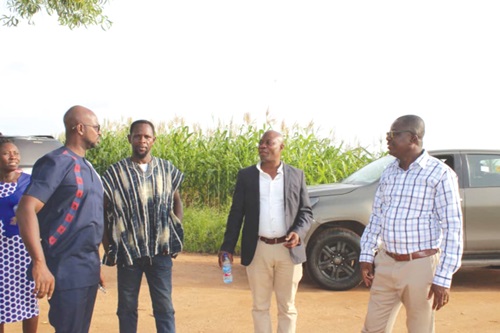
GIDA’s irrigation drive, a new path to improve all-year-round farming
One of the hurdles of Ghana's agricultural sector, especially food production, is the availability of reliable water resources for crops’ survival.
Advertisement
With abundant fertile farmland and favourable sunny conditions, the issue of over-reliance on rains has made farming very inconsistent due to increasing change in weather patterns as a result of climate change.
The Ghana Irrigation Development Authority (GIDA), a subsidiary of the Ministry of Food and Agriculture (MoFA), has been mandated to take charge of irrigation schemes of the agricultural sector to help in providing irrigation for farms, water for fish farmers and viable seeds of various crops to farmers in the country.
As part of the second phase of government's flagship programme dubbed "Planting for Food and Jobs (PFJ 2.0)”, renewed commitments have been made to create irrigation facilities that would help exploit the vast virgin and fertile farmlands in various parts of the country to promote all-year round farming in these very strategic areas.
Projects
Some of these projects include the Afram Plains Economic Enclave Irrigation Project (APEEIP) sited in Ahenase-Pitiku and Ataneata-Nkwantanang in the Kwahu East District of the Eastern Region.
The APEEIP is a multi-dimensional irrigation project being undertaken on six differently clustered sites under four zones. In all, six sites have been handed over to contractors to implement irrigation infrastructures in areas such Ekyeamanfrom, Konadu and Atonsu in the Kwahu Afram Plains South District and Kumawu NSS Farms in the Sekyere Afram Plains District of the Ashanti Region.
These identified areas have arable lands and abundant water resources made up of streams, rivers and the Volta Lake to support crop production.
Zones
Zone one comprises Kwahu Afram Plains South and Kwahu Afram Plains North while zone two is made up of Kwahu East, Kwahu West and Kwahu South". Fanteakwa, Birim North, Kwaebibirem, Atiwa and Denkyembour" make up zone three, with Sekyere Afram Plains and Sekyere Kumawu making up zone four.

An irrigation farm
The APEEIP will, in total, cover about 5,000 hectares of arable lands in the identified zones for the production of cereals and vegetables. These strategic projects by GIDA aim to address the problem of food insecurity and unemployment, having recognised the potential of these areas as the country’s food basket.
They are also ways to increase food production and crop yields to boost the national economy and promote import-substitution to help conserve foreign exchange.
Again, GIDA is advancing towards the building of a number of earth dams in all the regions of the north to bolster irrigation for farms in these regions which are severely hit by unfavourable weather patterns, with respect to irrigation.
Job creation
The APEEIP is estimated to create over 45,000 jobs along the value chain, reduce food importation, increase revenue generation from the export of produce to European and West African markets, as well as open the Afram Plains for other investment opportunities such as access roads, power (hydro and solar) and post-harvest storage facilities such as warehouses, cold rooms, silos and aggregation centres.
The project will ensure an all-year-round farming of vegetables such as tomatoes, onions, cereals and other crops to augment government's effort in reducing the importation of food and its consequent risk of Ghanaians being attacked by armed men, as has been recently reported on the Ghana-Burkina Faso Road.
Seed production
GIDA, under the leadership of its Chief Executive, Richard Oppong-Boateng, has commenced initiatives to make the Kpong Irrigation Scheme (KIS) the satellite centre for the production of seeds for rice farming in the southern belt.
The KIS is one of the over 180 irrigation schemes being managed by GIDA. While it looks at making KIS the major seed provider for farmers in the Southern part of the country in the short term, it will be consequently expanded to cater for the northern part in the long term.
This initiative has been one of the push factors propelling GIDA management to ensure that the schemes operate commercially to obtain the needed funds to invest in seed production, in collaboration with other departments and agencies under MoFA.
The KIS currently produces on 40 hectares; thus, a yield of five tonnes per hectare, resulting in 400 tonnes of paddy per annum, and would be hoping to soon increase its capacity by expanding its land area based on the demand and resource available.
Last month, the Chief Executive of GIDA told the Daily Graphic in an interview that seed production can be achieved if more investment is put into the schemes by expanding land areas for seed production and collaborating with other departments and agencies under the MoFA, as well as development partners such as Korea International Cooperation Agency (KOICA) and Korea Programme on International Agriculture (KOPIA).
Also, the completion of phase two of the rehabilitation and modernisation of the scheme by the Food Systems Resilience Project (FSRP) under MoFA, and its automation system deployed, is expected to support in running the scheme commercially.



